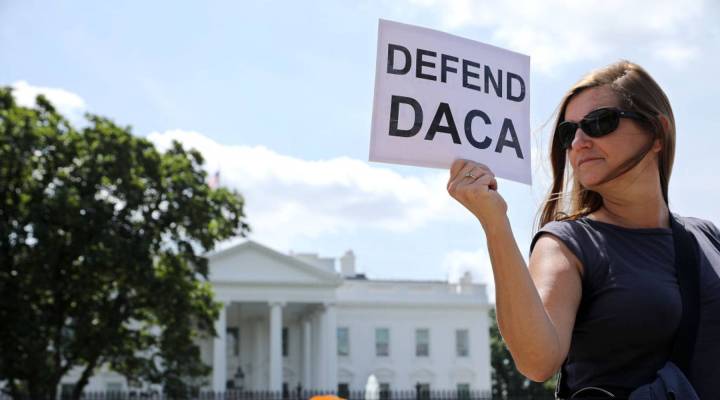
What could happen to workers and employers if President Trump ends DACA?
What could happen to workers and employers if President Trump ends DACA?

Hundreds of thousands of immigrants who were children when they arrived in the U.S. could soon be in legal limbo. They’re beneficiaries of DACA, the Deferred Action for Childhood Arrivals program put in place under President Barack Obama in 2012. DACA allows people who arrived in the U.S. as undocumented immigrant children to avoid deportation and to obtain two-year renewable work authorizations.
President Donald Trump is reportedly close to a decision on whether to rescind DACA, and there is widespread speculation that he may act before Sept. 5. That’s a deadline set by the attorneys general of Texas and several other Republican-led states, who have threatened that if Trump doesn’t eliminate DACA on his own, they’ll to go into federal court to try to overturn it. They argue that the original issuance of DACA under Obama was an overreach of executive power.
This week, the pro-immigration groups FWD.us and Center for American Progress issued a report that finds that nearly 700,000 DACA recipients are legally employed right now out of nearly 800,000 total DACA recipients nationwide.
“DACA has unlocked the enormous economic potential of this population,” said Tom Jawetz, vice president for immigration policy at the Center for American Progress. “Ninety-one percent are employed. Five percent have started their own businesses. These are individuals who are buying homes, they’re purchasing cars.”
The most likely scenario for canceling DACA, legal experts say, would be for the Trump administration to stop approving new applicants and stop renewing current recipients’ status as it expires over the next two years. The FWD.us report predicts that if that happened, an average of 30,383 DACA recipients per month would see their work authorizations expire, making them ineligible for legal employment in the U.S.
Critics of DACA, who are urging the president to repeal the policy, have argued that people who arrived in the U.S. without documentation, at whatever age, should not be allowed to work and take jobs away from U.S. citizens.
| A Dreamer caught between DACA and what comes next |
| How politics influence college plans for some undocumented students |
| Fearing deportation, families prepare custody paperwork |
But economist Ray Perryman at the Perryman Group in Waco, Texas, said that the U.S. already has very low unemployment (4.3 percent in July), and there are many job openings that remain unfilled.
“These people are not displacing U.S. workers, and if they left, we’d have a hard time replacing them,” Perryman said. “That’s not to say there’s not isolated incidents where maybe one person could get a job that one of these people have. But we very clearly need this workforce.”
Perryman, who studies the impact of immigrants on the economy, said the repealing DACA would exacerbate existing labor shortages for employers. He predicted that employers would be especially hard hit in states with a lot of immigrants, such as Texas, California, Florida and New York. And he predicted that if employers dismiss DACA workers as they lose their authorization to work over the next two years, sectors such as health care, hospitality, agriculture and construction would face significant job losses.
Tamar Jacoby at ImmigrationWorks USA, which represents small businesses that favor more legal immigration, said a lot of DACA recipients have gone to college and are now working in skilled occupations like nursing, teaching and law. She said repealing DACA would set their families and communities back economically.
“They might be living in the shadows, just scraping by in the kinds of jobs where you can get away with not proving your legal status,” she said.
Employers could also find themselves in a legal grey area if DACA is repealed, said Maria Echaveste, a senior fellow at the Center for Latin American Studies at UC-Berkeley and a former top official in the Clinton administration. She said that employers would run afoul of the federal immigration laws if they kept employing former DACA recipients after their work authorization expired. But employers might then be at risk of discrimination charges if they dismissed those workers in some cases — at least in states like California that have robust worker-protection laws.
“It would behoove them to be very careful and cautious,” Echaveste said.
There’s a lot happening in the world. Through it all, Marketplace is here for you.
You rely on Marketplace to break down the world’s events and tell you how it affects you in a fact-based, approachable way. We rely on your financial support to keep making that possible.
Your donation today powers the independent journalism that you rely on. For just $5/month, you can help sustain Marketplace so we can keep reporting on the things that matter to you.


















